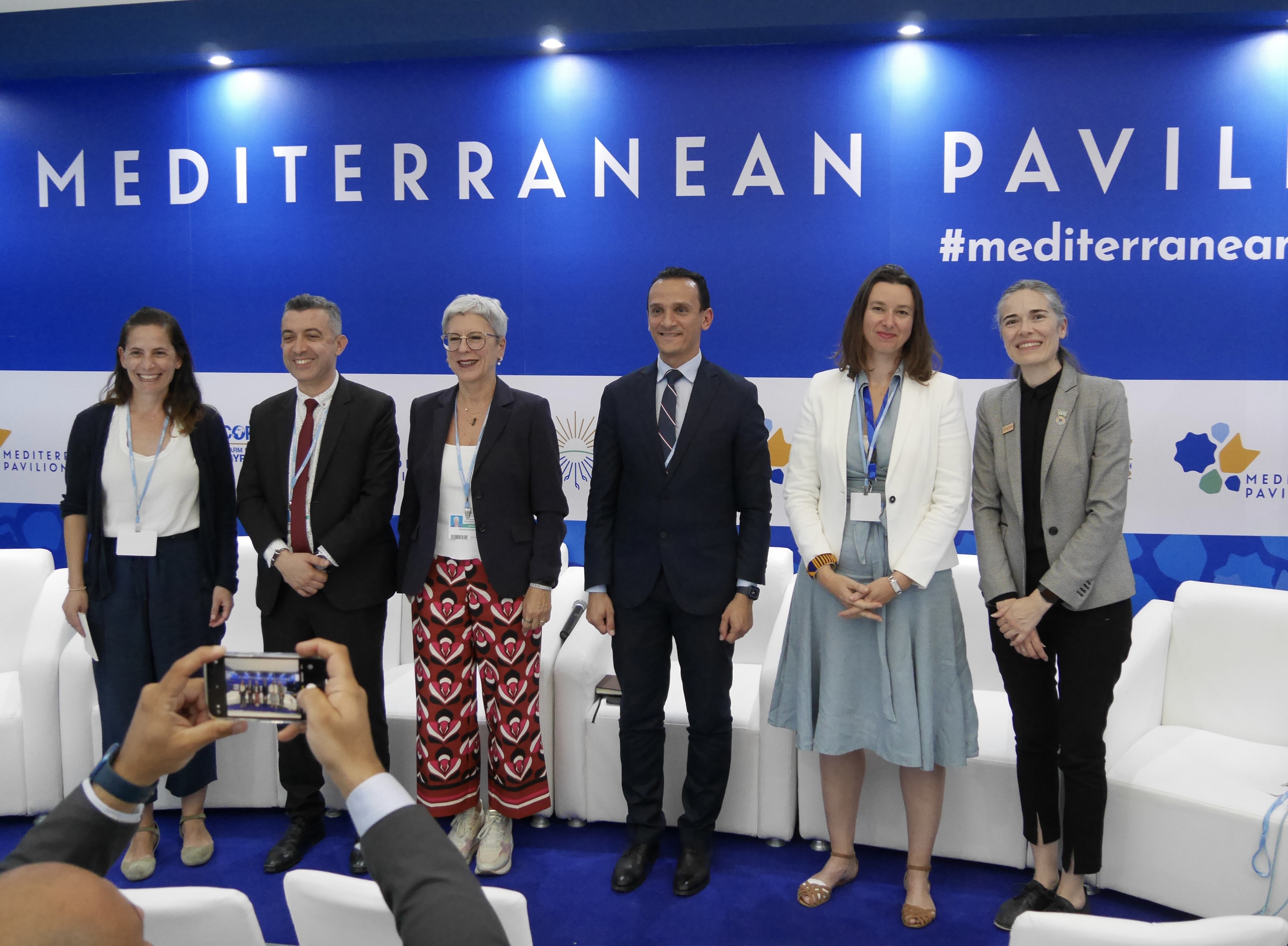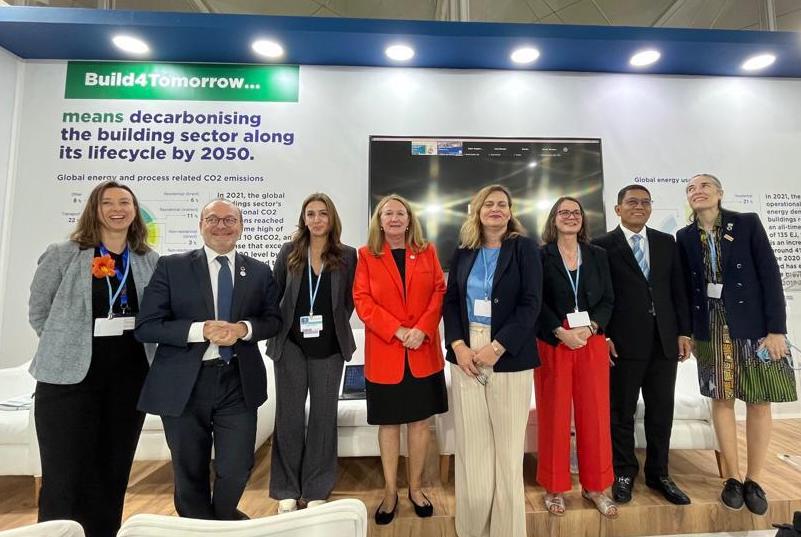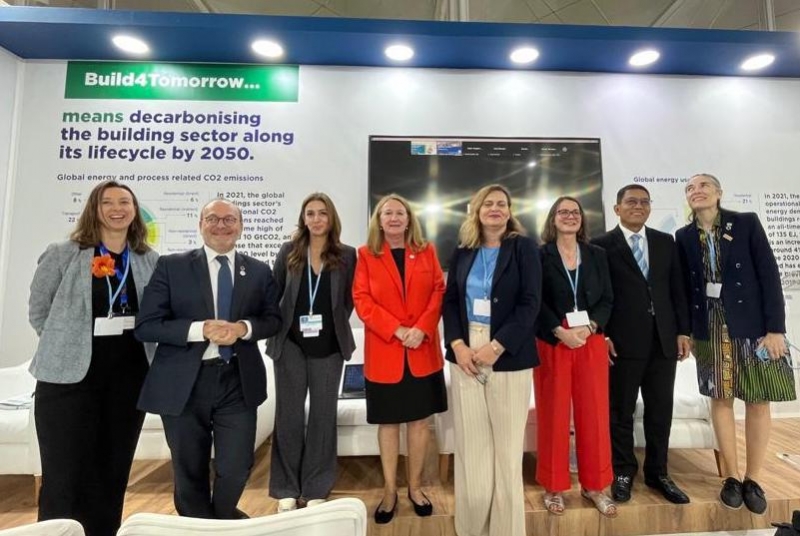The recent UN Climate Change Conference (COP27), in Egypt, marked a turning point for the Programme for Energy Efficiency in Buildings (PEEB) which will expand its operations this year to support countries in decarbonising and increasing the resilience of their built environment. PEEB will scale up its global operations through PEEB Med and PEEB Cool, two new initiatives that have received international funding.
With half of its 100 million inhabitants living in informal constructions and families spending a significant share of their income on air conditioning, Egypt is a good example of the urgent need and great opportunity of boosting adequate, green and affordable buildings to improve people’s lives.
Last November, the Egyptian city of Sharm El Sheikh hosted COP27, the UN Climate Change Conference that set a milestone in the international efforts to make buildings a central part of action on climate and sustainable development. The launch by France and Morocco of a call for achieving a Buildings Breakthrough this year is an example of that momentum.
As the recent GlobalABC’s Global Status Report showed, we are off track for the decarbonization of the built environment by 2050. While the just-released Global Alliance for Buildings and Construction annual report clearly shows how much progress is still required to reduce the energy intensity in buildings, there is a strong reason for optimism in that buildings remain the second most mentioned policy in the nationally determined contributions (NDCs).
Much of the 40% energy-related climate footprint of buildings and construction could be saved by designing and constructing better and retrofitting existing buildings to make them much more energy-efficient. To support countries facing this challenge, the Programme for Energy Efficiency in Buildings (PEEB) is scaling up its global operations though new initiatives and funding.
PEEB Med launch

From left to right: Victoria Jimenez, Jauad El Kharraz, Roberta Boniotti, Abd Elkhalek, Mathilde Bord-Laurans and Mariana Castaño Cano.
On 7 November, PEEB Med was presented at the Mediterranean Pavilion by the Union for the Mediterranean, MeetMED and PEEB. With a budget of 460 million EUR, the initiative will start implementation in 2023 in seven Mediterranean countries -Algeria, Egypt, Jordan, Lebanon, Morocco, the Palestinian Territories and Tunisia- benefiting 14 million people and helping to avoid 1 million tonnes of CO2 equivalent over a 50 years period.
PEEB Cool launch

From left to right, Mathilde Bord-Laurens, Rémy Rioux, Sarah El Battouty, Ingrid Hoven, Teodora Obradovic Grncarovska, Vera Rodenhoff, Dadan Kusdiana and Mariana Castaño Cano.
On 9 November, a high-level event at COP27 Buildings Pavilion marked PEEB’s ambitious scale up to start in 2023 after the Green Climate Fund (GCF) recent approval of 220 million EUR funding to boost green buildings through the new initiative PEEB Cool in 11 countries: Albania, Argentina, Costa Rica, Djibouti, Indonesia, Mexico, Morocco, Nigeria, North Macedonia, Tunisia, and Sri Lanka.
PEEB Cool will be jointly implemented by the Deutsche Gesellschaft für Internationale Zusammenarbeit (GIZ) and the Agence Française de Dévelopment (AFD) that will disburse 1.1 billion EUR in loans and 4 million EUR as project assistance grants, while the German Federal Ministry for Economic Affairs and Climate Action (BMWK) will contribute 2.5 million EUR as grants for policy support and international awareness.
Sarah El Battouty.
Opening the event, Sarah El Battouty, Global Ambassador by the UNFCCC High-Level Champions and Founder of ECONSULT, gave an overview of the situation in Egypt, starting by throwing a simple question to the audience: “Why are there so few green buildings?”.
In her view, until we make green and smart buildings comfortable and beautiful, until we make them also affordable for the average person; until then, green constructions will not take off at scale.
In developing economies like Egypt, we see few green buildings because “green buildings are at the high end” and they are only accessible through very large budgets. (...) We must change this reality and make green buildings the new normal”, she added.
A social priority
Rémy Rioux.
Rémy Rioux, AFD Director General, reiterated the agency’s full support to PEEB Cool and underlined the importance of greening the buildings sector. “At the COP we talk a lot about energy and agriculture, but we must also talk about buildings” because “building resilient and efficient buildings is a major climate issue and a massive social priority, and it is also a major source of job creation, with 220 million jobs already in the sector; and it’s a major health issue as we must reduce the death toll due to heatwaves in the world.”
Ingrid-Gabriela Hoven.
Ingrid-Gabriela Hoven, Member of GIZ Management Board explained that “with the support the governments of France and Germany, we are piloting approaches on how to bring together financial solutions that are fit for purpose at the local level, with the type of technical cooperation that is needed in order to build the capacity and the regulatory frameworks to bring PEEB to scale”.
Ms. Hoven highlighted the importance of building partnerships between the public sector, financial institutions and the private sector, to have a scalable initiative benefiting many countries.
Looking into the future, Ms. Hoven emphasized the crucial importance of pricing carbon emissions from buildings. “Through the work that we have done on data collection, measurement, capacity building, we are in the position to put a price on the carbon saved by efficient buildings,” she said. “This is extremely important because only if we put a price tag and we can actually calculate what does it means to really transform the whole building sector, only then will we be in a position to mobilize more funding”.
Advancing legislation and governance
Indonesia is one of the countries that will benefit from PEEB Cool. Dr Ir. Dadan Kusdiana, Director General, Directorate General of Renewable Energy and Energy Conservation, Ministry of Energy and Mineral Resources, stressed the importance of international cooperation for climate action and shared how Indonesia is introducing new climate friendly regulations for the building sector in a country which is home to over 270 million people and that is highly exposed to climate impacts.
Dr. Dadan Kusdiana.
Indonesia has a target of reducing energy-intensity use by 1% per year overall which is a challenging target for a developing economy. In the buildings sector the country already has laws on energy efficiency and building codes towards this end, he explained. Indonesia also has buildings standards for a more efficient use of lighting, electrical appliances and air conditioning and there is a plan to encourage the installation of electrical cooking stoves to replace more energy intensive cooking stoves.
North Macedonia is another country that will participate in PEEB Cool. Dr. Teodora Obradovic Grncarovska, State Counsellor on Climate Change, at the Ministry of Environment and Physical planning, underlined the important role of this new cooperation initiative and explained that her country is in particular facing challenges in transposing European legislation into national law and in meeting every new international commitment, that, on the other hand she said, will bring new opportunities for greening the country’s built environment while generating social co-benefits.
Dr. Teodora Obradovic.
“These policies and actions in energy efficiency (in buildings) are a triple win, in the sense that they are not just reducing GHG emissions, they also have negative costs and they generate green jobs”. Green buildings, she said, should be included in the overall sustainable development investment strategies in North Macedonia and in every country. Ms. Obradovic underscored the importance of favouring appropriate governance and coordination structures in the countries in order to coordinate all international and bilateral support in the buildings sector.
The upscale of PEEB arrives at a critical moment when the energy crisis is making shockwaves through the world proving that energy-efficient and resilient buildings are essential to prevent or alleviate this and upcoming international shocks.
Vera Rodenhoff.
Vera Rodenhoff, Head of International Cooperation and Implementation Initiatives, at the German Federal Ministry for Economic Affairs and Climate Action (BMWK), referenced to the intersection between the energy crisis and the multiple crises currently ongoing -climate, health and access to adequate housing. Ms. Rodenhoff highlighted that energy efficiency in buildings will help our countries become energy independent, thereby improving our energy security.
She also said that PEEB’s upscale is a good example of the importance of international cooperation to achieve climate and energy security as well as social wellbeing. “We are very proud to have kick started this project together with France and I really acknowledge all the work that France put into that, also in Paris (at COP21) where the Global Alliance for Building and Construction was launched. (…) Collaboration works, innovation works and scaling works!”, she concluded while closing the event.
Learn more about PEEB Cool here.
Photos by: 10 Billion Solutions


 more
more